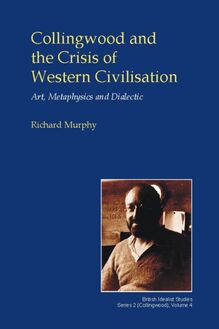Collingwood and the Crisis of Western Civilisation , livre ebook
183
pages
English
Ebooks
2012
Vous pourrez modifier la taille du texte de cet ouvrage
Obtenez un accès à la bibliothèque pour le consulter en ligne En savoir plus
Découvre YouScribe en t'inscrivant gratuitement
Découvre YouScribe en t'inscrivant gratuitement
183
pages
English
Ebooks
2012
Vous pourrez modifier la taille du texte de cet ouvrage
Obtenez un accès à la bibliothèque pour le consulter en ligne En savoir plus
Publié par
Date de parution
23 février 2012
Nombre de lectures
0
EAN13
9781845404062
Langue
English
Publié par
Date de parution
23 février 2012
Nombre de lectures
0
EAN13
9781845404062
Langue
English
Title Page
COLLINGWOOD AND THE CRISIS OF WESTERN CIVILISATION
Art, Metaphysics and Dialectic
Richard Murphy
Copyright Page
Copyright © Richard Murphy, 2008
The moral rights of the author has been asserted
No part of any contribution may be reproduced in any form without permission, except for the quotation of brief passages in criticism and discussion.
Originally published in the UK by Imprint Academic
PO Box 200, Exeter EX5 5YX, UK
Originally published in the USA by Imprint Academic
Philosophy Documentation Center
PO Box 7147, Charlottesville, VA 22906-7147, USA
Digital version converted and published in 2012 by
Andrews UK Limited
www.andrewsuk.com
www.imprint-academic.com/idealists
Abbreviations
Works by Collingwood:
RP
Religion and Philosophy (1916)
TC
Truth and Contradiction (1917)
FFH
‘A Footnote to Future History’ (1919)
SM
Speculum Mentis (1924)
PAE
‘The Place of Art in Education’ (1926)
AM
‘Art and the Machine’ (1926?)
EPM
An Essay on Philosophical Method (1933 and 2005)
NMS
‘The Nature of Metaphysical Study’ (1934)
MM
‘Method and Metaphysics’ (1935)
MGM
‘Man Goes Mad’ (1936)
RI
‘Realism and Idealism’ (1936)
PA
The Principles of Art (1938)
A
An Autobiography (1939)
EM
An Essay on Metaphysics (1940 and 1998)
NL
The New Leviathan (1942 and 1992)
IN
The Idea of Nature (1945)
IH
The Idea of History (1946 and 1993)
EPA
Essays in the Philosophy of Art (1964)
EPH
Essays in the Philosophy of History (1965)
EPP
Essays in Political Philosophy (1989)
Works by Ortega y Gasset:
RM
The Revolt of the Masses (1932)
HS
History as a System (1941 and 1962)
MU
Mission of the University (1946 and 1963)
MP
Man and People (1957)
MC
Man and Crisis (1958)
DA
The Dehumanization of Art (1968)
Acknowledgements
I would like to express my gratitude to Professor David Boucher, whose assistance and encouragement throughout my work on this book (which began as a PhD thesis under his supervision) have been invaluable. I also wish to thank him for the opportunity to revise the thesis in this form.
I am particularly indebted to Dr. Mark Evans for his helpful comments and useful advice. Also Professor James Connelly deserves thanks for his helpful suggestions and Professor Roland Axtmann for his insightful critical comments.
The R.G. Collingwood Society generously provided me with financial assistance during my study and for this I am very grateful.
Thanks are due also to my friends (both nearby and further afield) and my colleagues in the Department of Politics and International Relations at Swansea University, who in a variety of ways have contributed to the formulation of my thoughts and the completion of this work.
I also want to thank my family: my brother, Brian, and my sister, Eimear. This book is dedicated to my parents, Roger and Emily Murphy, who contributed greatly with their continuous encouragement and support.
Introduction
The importance of R.G. Collingwood ought to be understood in the context of the legacy of romanticism and the development of historical thinking in the late nineteenth and early twentieth centuries. The emergence of ‘historicism’ and the influence of Romanticism meant a change from regarding philosophy as the pursuit of abstract transcendental truths towards regarding truth and meaning as immanent , historically contextual, and contingent. This critical development, in both philosophy and Western culture more generally , occurred in response to what was perceived as a profound crisis in Western civilisation. Collingwood was one of the thinkers that provided a key positive contribution to these movements, and developed a response to the crisis.
The transition towards a greater appreciation of historicity and contingency, brought about by the influence of Romanticism and historicism, meant that philosophy comes to be understood to a greater extent as philosophy of cultures and civilisations. It is in this context that the notion of ‘crisis’ ought to be understood: at any given time, a culture or civilisation may undergo conditions of relative strength or vigour and of relative crisis or decadence. [1] Also, although the focus of this study is primarily on Collingwood, similar philosophies were developed by Ortega y Gasset and Croce, and in the course of the book these affinities, especially with Ortega, will help to shed light on Collingwood’s philosophy. [2]
The theme of the crisis of civilisation pervades Collingwood’s work, and although this theme has been mentioned by some commentators on Collingwood’s philosophy, it has not been discussed in much detail. David Boucher asserts that the later published works of Collingwood reflect his lifelong preoccupation with identifying and combating the enemies of civilisation, by coming to a better self-understanding (Boucher, 2000: 186). Collingwood was prolific in formulating theories about what ailed civilisation and, as Boucher rightly points out, Collingwood’s diagnoses, prognoses, and remedies are best viewed as explorations into various aspects of the disease , constituting complementary, rather than alternative, theories (Boucher, 1989: 231).
Boucher refers to an explosion and proliferation of ‘crisis’ literature in the period between the two world wars in Europe, where civilisation was described as being in a state of severe crisis, or even experiencing its final death throe. [3] Similarly, William M. Johnston remarks that Collingwood belonged to that generation of inter-war thinkers who felt called upon to interrogate the entire tradition of the West in search of its raison d’être . In the case of Spengler and Freud, this interrogation yielded evidence of decline and collapse. In the case of Collingwood and Croce, on the other hand, the scrutiny was pursued with the avowed hope of finding fresh sources of rejuvenation . Unlike Spengler, Johnston explains, Collingwood never doubted that the West could recover its creative energies (Johnston, 1967: 139-41). However, it was throughout the late nineteenth and early twentieth centuries, and not just in the inter-war years, that this theme was important. The theme of the crisis of Western civilisation is prominent in late nineteenthand early twentieth-century philosophical , social, political, literary and artistic discourse.
What I propose to do here is briefly to outline what Collingwood saw as the crisis of Western civilisation, and its Romantic and historicist context, and then to explain the order of enquiry. To put it very briefly, the crisis of civilisation, for Collingwood, is an over-reliance on abstractly rationalistic forms of thinking. The solution is the cultivation of forms of emotional expression, and to think historically and dialectically.
The theme of the crisis of civilisation is strongly present in Collingwood’s philosophy of art, where he argues that civilisation is in crisis because of the suppression of emotion. In the ‘Fairy Tales’ manuscript (written in 1936-37), this same suppression of emotion is blamed for an obsession with utilitarianism and the failure to understand the primitive survival of emotion in contemporary civilisation . The suppression of emotion is exemplified in the suppression of art proper by amusement art and the ill effects of industrialisation, and by the destruction of the countryside. In his theory of logic and metaphysics Collingwood regards Western civilisation as being under threat from natural science and the effects of positivism and utilitarianism. Here dialectical and historical thinking are seen as a solution. Both of these aspects of the theme of the crisis of civilisation and its solution coincide in Collingwood’s account of morality, politics and civilisation.
In Speculum Mentis , following the Romantic tradition, Collingwood identified the crisis of civilisation as being the detachment of the forms of experience, art, religion, science, history, and philosophy, from one another. The solution to this spiritual fragmentation is the reunion of the forms of experience ‘in a complete and undivided life’ (SM, 36). Following Speculum M



